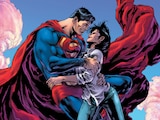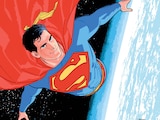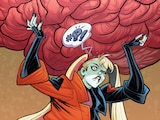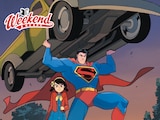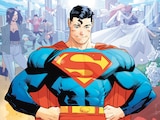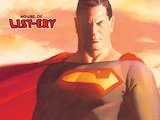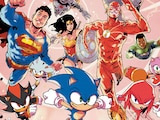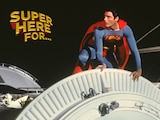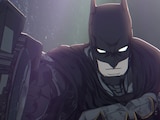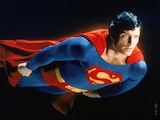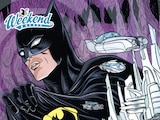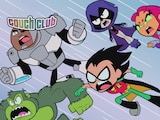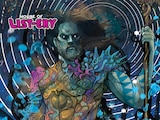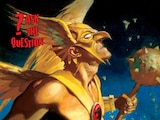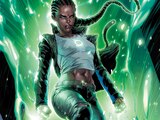The 1980s were a transformative time for DC Comics. In 1987, the Justice League relaunched with an entirely new philosophy: to depict the tensions and everyday problems of contemporary America. Notably, this included gender inequality. Female characters like Big Barda, Black Canary, Doctor Light and the dynamic duo of Fire and Ice encountered sexism in their lives as superheroes, sometimes from their own teammates. As a result, Justice League International committed itself to showing how sexist views weren’t something held only by evil masterminds. They were far more pervasive in society than that. Through Big Barda’s experiences in particular, writers Keith Giffen and J.M. DeMatteis crafted a nuanced portrait of women in the late 1980s, imbuing Justice League International with a feminist perspective.

Big Barda is nothing short of extraordinary. She is a seven-foot-tall warrior who was raised in the hellfire of Apokolips, the home of the villainous Darkseid. With her husband, Mister Miracle, Barda has turned the page on her dark past and fights for good in the universe. Barda was created by Jack Kirby in 1971 as a stand-in for Kirby’s wife, Roz, and she has been adored by generations of DC fans since.
Barda has long been a feminist icon because of how she bucks gendered expectations. Her tall height, muscular build and assertive personality challenges the role that married women have traditionally played in superhero comics. In Justice League International #7, Batman assigns Mister Miracle to monitor duty, which Scott protests, citing that he had made a promise to Barda that he would be home soon. Batman expresses his surprise that Scott has a wife, saying that, “In our line of work, that’s not exactly a wise move. Your wife—” Mister Miracle then cuts him off with, “—could probably take out the Joker with one hand.”

As Mister Miracle is quick to point out to other men, Barda is not a demure waif who must be protected from the evils that he encounters as a superhero. (Not that women can’t be demure waifs either! After all, in a world where there are Clark Kents, there must also be Jimmy Olsens!)
At the same time, Barda strikes a rare balance between her embrace of traditionally feminine tasks, such as housework and cooking, alongside her “masculine” qualities. In Justice League International, Barda and Mister Miracle live in a suburban house where Barda happily spends her time as a homemaker. In a backup story in Justice League International #18, Barda cooks dinner while wearing an apron emblazoned with the word “BOSS” on it. That Barda was a homemaker didn’t take away from the fact that she was, most certainly, a boss.
In effect, this summarizes why Big Barda and Mister Miracle’s entire dynamic is so special in comics. As New Gods from entirely different planets in outer space, why would Big Barda and Mister Miracle be governed by twentieth century human norms? The fact that Barda is taller, stronger, more confident and a better fighter than Mister Miracle isn’t a point of insecurity for him. Crucially, Barda doesn’t exist just to make Mister Miracle feel secure in his own masculinity.

While Justice League International highlighted career women like Doctor Light (a United Nations diplomat and scientist), its attention to Barda’s life as a homemaker brought a refreshing, feminist perspective to the series. As Mister Miracle’s actions show, he respects his wife immensely, whether she’s trying to make lasagna or she’s fighting the bounty hunter Lobo. As JLI shows, Barda was under no pressure to conform to traditional feminine ideals. Even though Barda and her warrior upbringing have little in common with what society considers “feminine,” she doesn’t look down on “women’s work.” It is precisely because she is free from traditional gender roles that Barda finds enjoyment, not dissonance, in housework.
Justice League International was groundbreaking because it takes social problems like sexism seriously, even if the tone of the book is often comedic and satirical. Through its treatment of characters like Big Barda, Black Canary and other female Justice Leaguers, JLI was a direct response to the changing sociopolitical landscape of the late 1980s. From the very beginning, the series declares that pretending female superheroes exist in an environment free of irritating chauvinists is ludicrous. Even Batman has some outdated ideals he needs to unpack. Thankfully, Big Barda and Mister Miracle are there to show us all a more equitable vision of what life as a superhero couple could be.
Justice League International by Keith Giffen, J.M. DeMatteis, Kevin Maguire and more can be read in full on DC UNIVERSE INFINITE.
Jules Chin Greene writes about comics for DC.com, and his work can also be found at Nerdist, Popverse and Multiverse of Color. You can follow him on Twitter and Bluesky at @JulesChinGreene.
NOTE: The views and opinions expressed in this feature are solely those of Jules Chin Greene and do not necessarily reflect those of DC or Warner Bros. Discovery, nor should they be read as confirmation or denial of future DC plans.

